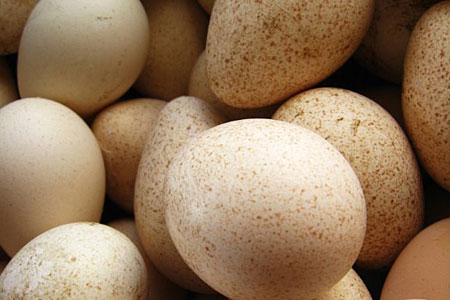
The best laying turkeys don’t lay nearly as well as the best laying chickens. Plus, given that a turkey is bigger than a chicken, and therefore eats more than a chicken, keeping turkeys strictly for eggs is not a practical endeavor. However, if you have turkeys anyway, you may as well enjoy their delicious eggs. How many eggs you can expect a turkey to lay depends on its strain and also on your management.
How Many Eggs a Turkey Will Lay
Depending on the strain, the average heritage turkey hen lays only about 100 eggs per year. However, some strains — particularly Bronze and Bourbon Red — may lay half again that many. Or even more.
Most turkeys lay an egg every other day or so. A turkey typically starts laying at around 7 months of age. Some hens, however, may not start laying until they are nearly a year old.
Peak egg production occurs between 2 and 5 years. >From then on, although the eggs get larger, production gradually declines.
Few turkey hens lay year around. They are more typically seasonal layers, starting in late winter and laying into early summer. Most turkeys stop laying during the fall and winter.
Keep Them Laying
One of the causes of low egg production in turkeys is their tendency to brood after laying a clutch of about a dozen eggs. Collecting the eggs so they don’t accumulate in a nest will keep a hen laying longer before she decides to brood.
A turkey hen’s health also affects her egg production. Proper nutrition, along with fresh clean water available at all times, will help maximize egg laying.
Most turkeys are kept for meat, rather than for eggs. Even so, supplemental winter lighting can somewhat extend their egg production.
Egg Comparisons
Unlike chicken eggs, turkey eggs don’t come in a rainbow of shell colors. Turkey eggs are off-white with attractive brown speckles. And they are much larger than chicken eggs.
A large chicken egg, needed for most recipes, weighs about 2 ounces or 57 grams. A jumbo chicken egg weighs 2.5 ounces, or about 71 grams. Compare that to an average turkey egg weighing about 3 ounces or 85 grams.
Nevertheless, you can substitute turkey eggs for chicken eggs in any recipe. You just need to know a bit about egg size conversions for recipes.
But if you’re cooking omelettes, scrambled eggs, or the like, you don’t need to convert anything. Just prepare them as you would chicken eggs, and enjoy the delicious flavor of your fresh homegrown turkey eggs.
Helpful Links
How the Eggs of Chickens, Turkeys, Ducks and Geese Compare
How to Choose the Best Turkey Breed
Turkeys Available from Cackle Hatchery®
And that’s today’s news from the Cackle Coop.
Gail Damerow has written several books about keeping poultry, many of them available from the Cackle Bookstore.

